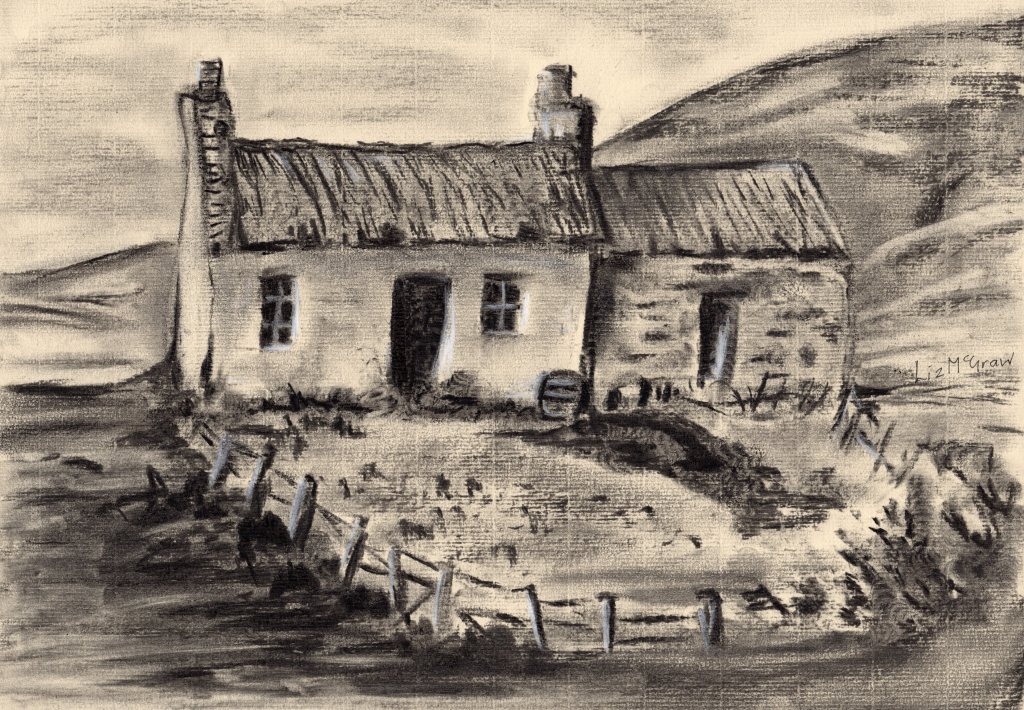
In this post, I am taking a bigger leap back in time and will be telling the story of the life and times of Alexander McCulloch my husband’s G. Great Grandfather on his mother’s. side.
His story is set in 19th Century Sutherland. The following description is based on my interpretation of the records I have found and information I have gleaned from a variety of historical articles describing life in the Highlands.
Alexander lived in Sutherland during the second phase of the Highland Clearances. A time when Sutherland was coming to terms with the devastating impact of the clearances on the Highlanders.
Alexander McCulloch 1824 – 1905
Alexander’s parents, John McCulloch and Mary Ross, were married in Fearn, in 1822. The third of six children, Alexander was born in Tarbat, Ross and Cromarty, Scotland on 4th June 1824. His father John was an agricultural worker. His birth was recorded in the Old Parish Records for Logie Easter.

He grew up in the county of Ross and Cromarty and, at the age of 15, he was recorded in the 1841 Census living with his parents and siblings in Kilmuir, Easter.

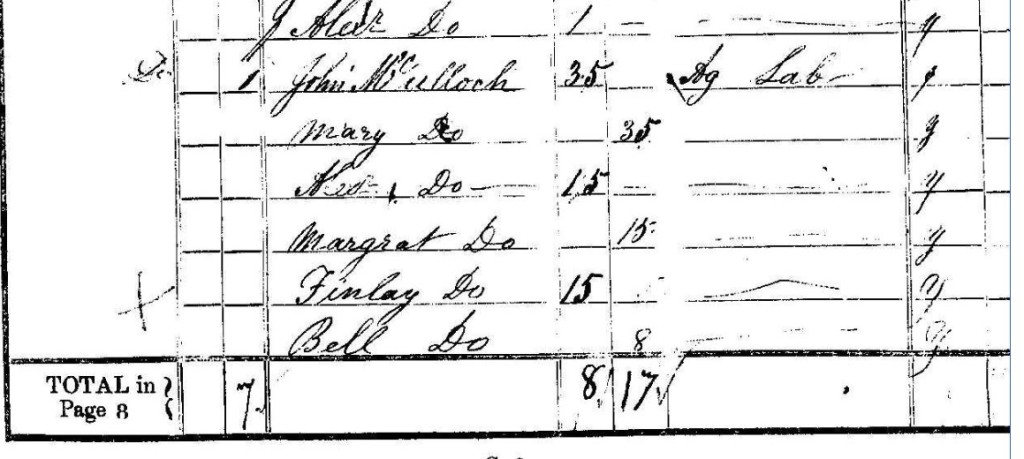
At the age of 23, Alexander was living in Scotsburn, Logie Easter, when he married Janet Fraser of Ordin Parish, Creech. The couple were married on 22nd July 1847. Jessie was also 23 years old.
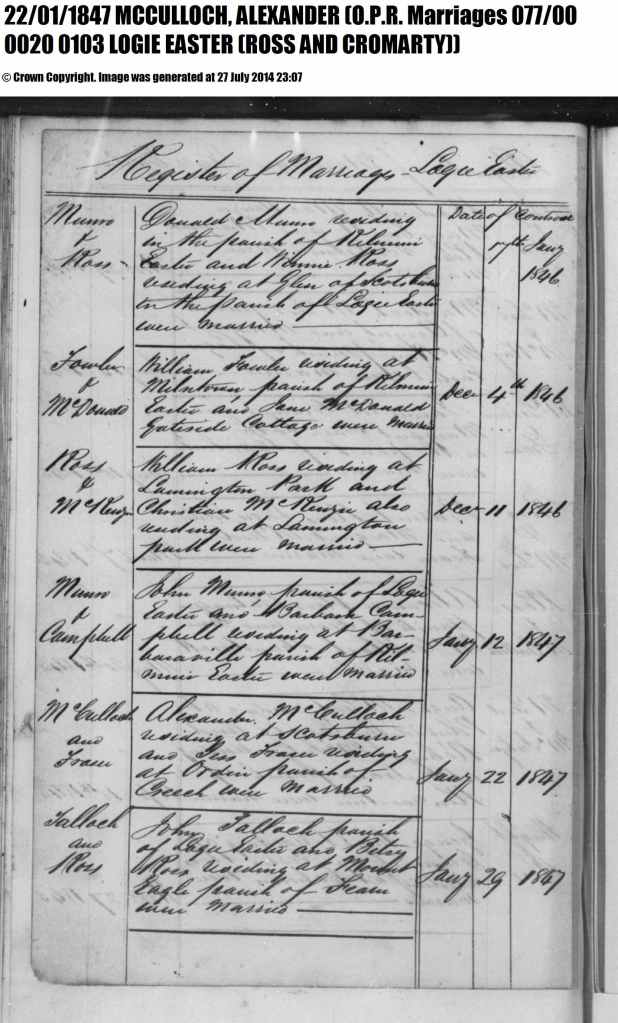
Janet, sometimes known as Jess or Jessie, came from Ferrintosh on the Black Isle, Ross and Cromarty. She was born on 8th Nov 1823. Her father, Roderick Fraser, was a master shoemaker. Her mother was Betsy MacLean.

After their marriage, Alexander and Jess lived in various locations mostly around Sutherland and the Dornoch Firth. As an agricultural worker, Alexander sometimes worked as a farm servant, sometimes as a ploughman.
Accommodation would have been provided by the farm’s owner. It was usual at that time for farmworkers to renew their contracts annually, often moving to a different farm which offered better pay and conditions or indeed because their previous employer found a cheaper employee.
Most of their children were born in the Parish of Creech, which suggests the family was fairly settled in that area for some time. Together they had nine children, John, b. 1848 in Dornoch, Roderick, b. 1849, Thomas, b. 1853, Mary, b. 1855, Donald, b. 1858, all born in Creech, Jessie, b. 1860 in Lairg, Alexander, b. 1862 in Bonar, Finlay, b. in Kincardine, 1864 and Philip , b. 1865 in Creech, Sutherland.
In the census of 1851, the family was resident on the estate of Newmore in Rosskeen, where Alexander was employed as a farm servant. They had two little boys, John, aged 3 and Roderick, aged 2.

The Highlands by this time was much changed from that of the previous century. The Highland Clearances had impacted greatly. In many ways, life was improving for the people of Sutherland.
Farm methods were being improved. Fields were being manured and crop rotation had been introduced.
Newmore was one of the larger farms in the Parish. It was a tough life. Family life would have centred around the seasonal work of the farm. Farm duties throughout the year would have included ploughing, sowing, harvesting, thrashing and shearing.
Like other servants in the area at that time, Alexander would probably have been paid about 4 pounds a year. His wages would have been supplemented with farm produce. Typically servants would have been given a portion of meal, potatoes and linseed, peat to fuel a fire, straw for their cow, and a small garden or piece of land to grow their own produce.
If Jessie worked on the farm too, which she most likely did, especially during the summer months, she would have been paid 10 shillings and given a pair of shoes. Women helped with much of the work on the farm other than ploughing.
The diet of the family would have been simple and varied little. Breakfast usually consisted of thin porridge called brochan which was eaten with peasemeal bread.
In summer they would have eaten whey, potatoes, fermented oats, and cabbage. If the farm owner killed a cow in the winter, they might have been given broth, and possibly beef. Luxuries, such as butter, curds and ale, may also have been provided by the farm owner.
At certain times of the year, Alexander and his family may have taken part in local feasts to celebrate the end of sowing and shearing. Another feast day was enjoyed when the people of the region celebrated the Old New Year Day on the 14th of January.
The people of Sutherland were a mix of Norse and Gael descent. Like most of the labouring class in the region at that time, Alexander and Jess would have spoken mainly Gaelic. If they did speak English, they would have spoken it with the distinctive accent peculiar to the northern Highlanders.
Highland life was very hard. The landscape and weather made the Highlanders a sturdy race of people able to cope with the adverse conditions and deprivations. Lack of nutrition and fierce conditions meant they were generally small in their physique. Statistics of prisoners captured in 1745 reveal that the average Highlander was only 5 feet 4 inches tall.
Sutherland was an extremely remote place to live, having no roads until 1819. The fact that its population spoke mostly Gaelic made it even more isolated from the south.
However, the communities of Sutherland and Ross and Cromarty did not feel isolated. They were a self-sufficient race living in little townships, known as clachans, which were clustered in glens and hillsides throughout the highlands. Their houses were built of stone with turf roofs and outhouses thatched in heather or rush.
By the time of the 1861 Census, Alexander and Jess were living in Bonnar Village, Sutherland, By then they had a further 4 children, Thomas aged 8, Mary aged 6, Donald aged 3 and Jessie aged 1. Their eldest son, John was 13 years old. Their other son, Roderick, does not appear to be with the family at the time of this census entry. He would have been 12 years old.
Alexander was then 35 years old and was employed as a ploughman. Though still poorly paid, work as a ploughman was more specialised than that of a farm servant and sometimes came with the use of a cottage. The old Highland plough had been replaced by the new two-horse plough.
It was in Bonar that Jessie gave birth to another son, named Alexander after his father, on the 5th October 1862. Alexander was my husband’s great grandfather.

In 1871 they lived in Over Skibo, next to Skibo Castle, right on the border of the Creech and Dornoch Parishes. Alexander was once again working as a farm servant. Roderick, known as Rodi, was then 22 years old and was also working as a farm servant.
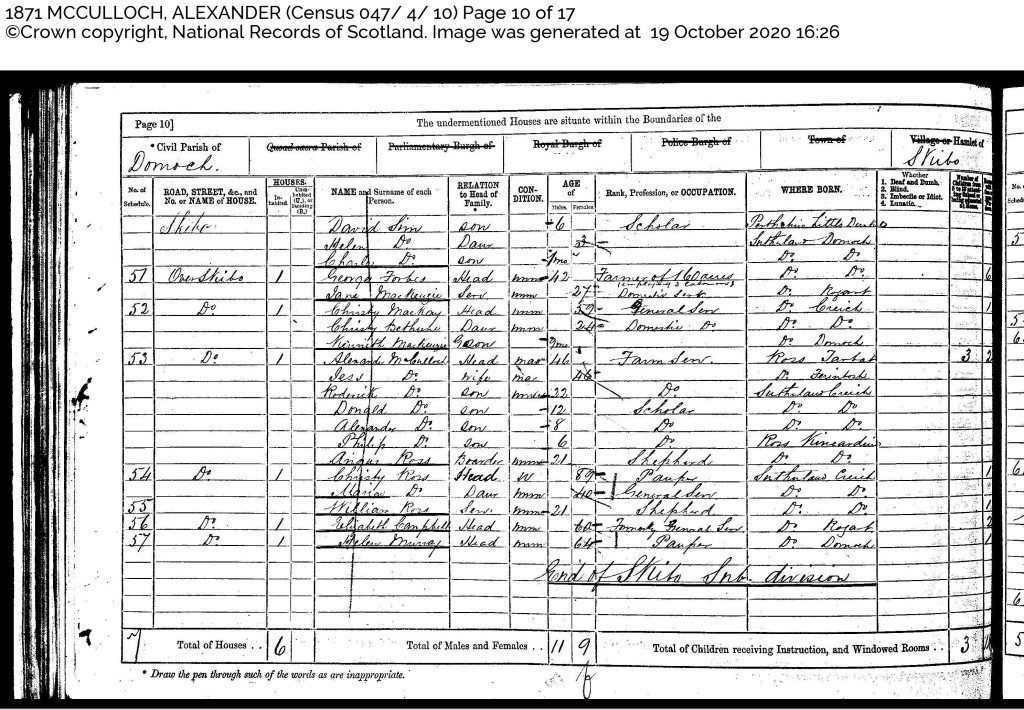
There were apparently six houses in Over Skibo in 1871, though I can only make out one in the map below from 1874. This was probably the main farm of Over Skibo run by George Forbes. The farm was 50 acres and George employed 3 general labourers. I assume from this entry that these employees were Christy Makay, of No 52 Over Skibo, and Alexander and his son Roderick who were living at No 53.
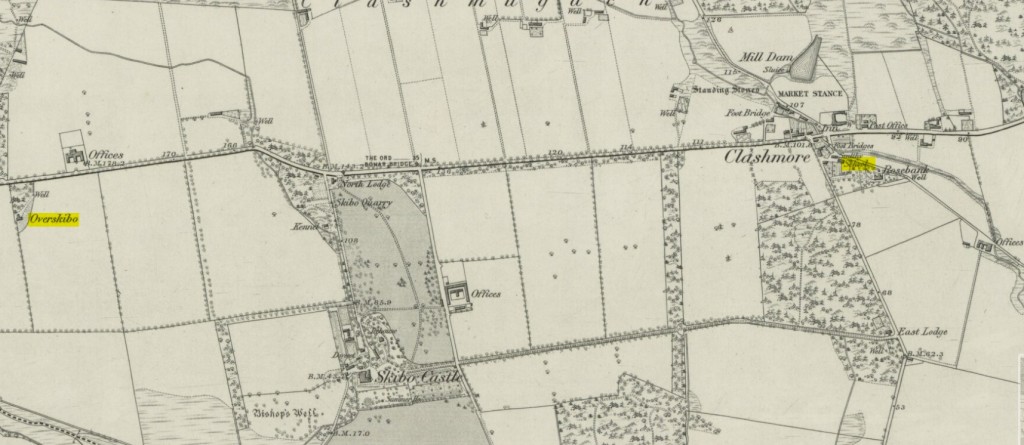
Survey date: 1874 Publication date: 1879
The younger children, Donald, then 12, Alexander, 8, and Philip, 6, were scholars. It is possible they attended the two-roomed school in nearby Clashmore, which principally served the children of estate workers. Church schools had been springing up across the Highlands since the clearances and education was more readily available.
Daughter, Mary and Jessie, did not appear on this census with Alexander and Jess at this time. Mary would have been 16 and may have gone off to work somewhere. Young Jessie would only have been 10 at this time so it is unclear where she was.
At this point, the family also had a boarder named Angus Ross, aged 21. Angus was a shepherd. It was common for unmarried shepherds and farmhands to lodge with other farming families.
In the Spring of 1875, Jessie became unwell. She developed inflammation of the lungs, most likely caused by pneumonia. At the age of 52, and having given birth to nine children, it is perhaps not surprising that her health at that time would be failing. Highland winters can be bitterly cold and harsh, and Jessie was ill for over two weeks before succumbing to the infection. She died on 17th April 1875. Her son, Rodi, registered her death.

By 1881, Alexander had moved again and was living in Golspie. It seems that after the death of his wife, his daughters, Mary and Jessie, returned to live with him. He was working as an Agricultural Labourer. His son, Finlay, was 16 and worked as an Agricultural Servant. Mary and Jessie were then in their twenties and worked as Domestic Servants. Jessie by then had a baby daughter of her own, named Jessie. This child was illegitimate.
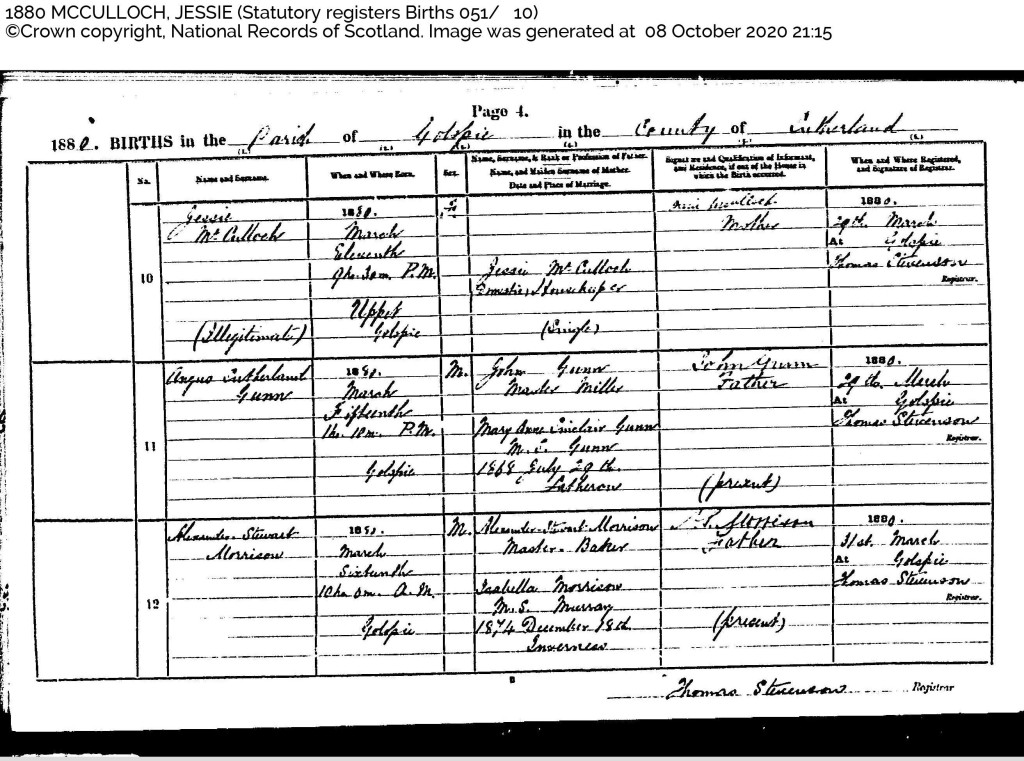
His son, Alexander, also lived nearby in Golspie, where he was employed as an apprentice gardener.
Later that same year, Alexander was married again. This time he wed Catherine Graham in Doll, in the Parish of Clyne, Sutherland on 9th Dec 1881. The marriage was performed by John Murray, the Minister of Clyne and witnessed by John Graham (possibly a relative of Catherine.)
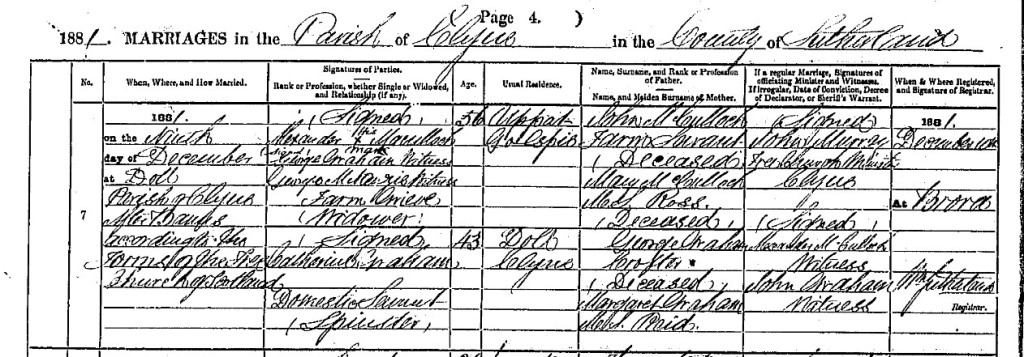
Before marrying Alexander, Catherine was living in Doll with her mother, Margaret, and her youngest brother, John, a Wood Labourer. Margaret had been widowed for many years but was by then in her 70’s. Catherine was 43, but had never been married. Her father, George, had been a crofter in Doll but had died in 1869.
The 1881 census shows that at that time Margaret was still running the croft herself and Catherine was working as a general servant.
Although her mother was still alive when Catherine married she seems to have taken over the croft soon after. Marriage to a man with Alexander’s farming experience may have been useful to Catherine and, as a widower, Alexander would have benefitted from the comforts that a wife with her own croft would have been able to provide. Alexander had worked as a hired servant for many years, moving wherever the work took him and with no settled home. Marriage to Catherine would have secured a home for him in his later years.
In 1901, Catherine and Alexander were still living in Doll. Catherine, by then 63, was still a Crofter ,whilst Alexander continued to work as a farm servant on the farms around Doll. By this time, Alexander was quite elderly. The Census suggests he was 82, but in fact, he would have been 76. He had most certainly had a hard life. He had worked on farms since he had been a young man and, was still working into his old age. At some time in his life, Alexander had been a Farm Grieve. This was an old Scottish occupation which meant he was a farm manager overseeing the work of the other hands.
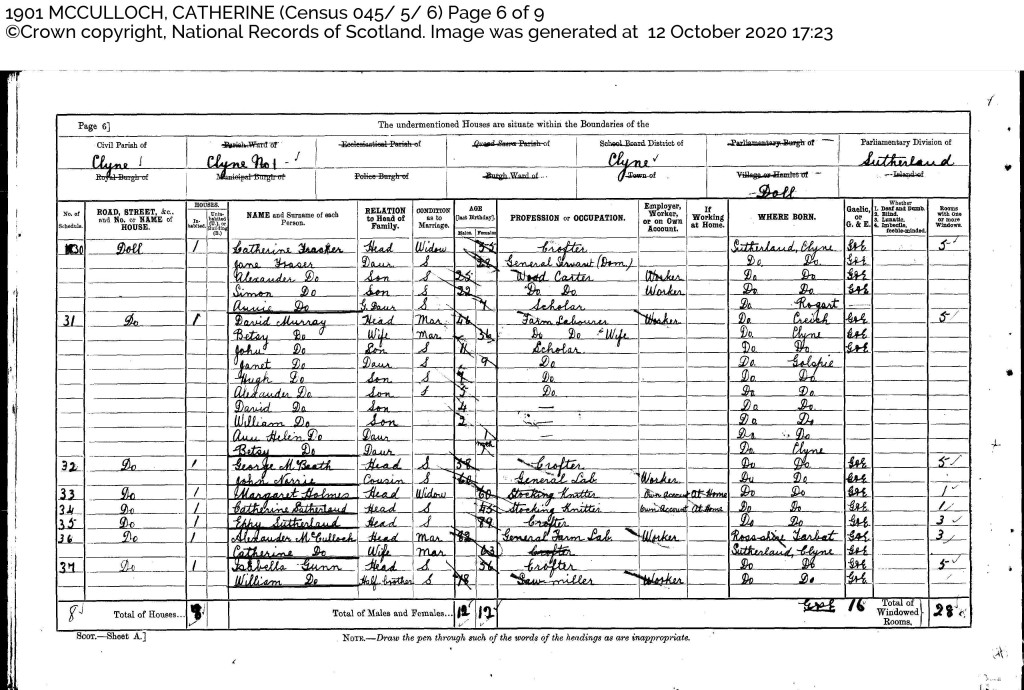
Alexander died from sudden heart failure at Doll on 24th April 1905. He was 80 years old. His brother-in-law, George Graham, registered his death.

Catherine herself continued to live in Doll until her death in 1914 from Valvular Disease of the Heart and Senile Decay.
Great blog Liz packed full of so much detail and thoroughly well researched
LikeLiked by 1 person
Thank you so much for your kind comment.
LikeLike
You’re very welcome Liz
LikeLike
Liz, I have to tell you I am in happy tears reading this blog post. John McCulloch and Mary Ross are my 4th great grandparents, Alexander and Jessie Fraser are my 3rd great grandparents and our family records say “Finlay (Philip) McCulloch” and Margaret Agnew are my great great grandparents. This leaves me curious of which sibling, Philip or Finlay is our lineage through. Do you happen to have any info on Alexander’s siblings or know how I can access it? Please feel free to email me as well.
Again, from the bottom of my heart, THANK YOU for compiling this amazing information. Much love!
LikeLiked by 1 person